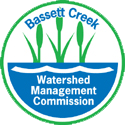Projects
Parkers Lake Drainage Improvement and Chloride Reduction Project
Plymouth
Project Number: PL-7
Project Status | Active
In August 2019, the BCWMC approved a proposal by the Commission's Engineers to develop a feasibility study for this project in conjunction with the Mt. Olivet Stream Restoration Project, also in Plymouth. A public open house on both projects was held in February 2020 and the feasibility study was approved in May 2020 with intent to implement Alternatives 3 and 6. A public hearing was held September 17, 2020; there was no public input. The project was officially ordered by resolution on that date and an agreement with the city of Plymouth to design and construct the project was approved. The drainage improvement project was completed in May 2022 (see Drainage Project Final Report, Dec 2023).
Work continues on the chloride reduction portion of the project. To date, this part of the project has included facilitated discussions and review of chloride data by a group of technical stakeholders which led to the identification of possible structural best management practices that could be used to reduce chlorides (see Chloride Reduction Technical Stakeholder Results, July 2022). In November 2023, results of an analysis of chloride extraction or dilution methods were presented (see Chloride Reduction Dilution/Extraction Analysis, Nov 2023). As directed by the Commission, city and Commission staff will develop a scope for a holistic approach to source reduction for consideration in early 2024.
Project Funding | Not Grant Funded
The final project costs for the drainage improvement project was $178,973 which was under the original budget of $185,000. (See drainage improvement project final report, December 2023).
The chloride reduction project is ongoing and has a budget of $300,000.
Both projects are funded through an ad valorum tax levied by Hennepin County on all Bassett Creek Watershed residents.
Project Description
This project stabilized slopes and made other drainage and stormwater management improvements along an intermittent stream reach beginning at 18th Avenue North and continuing downstream 1,100 feet to just northwest of the intersection of County Road 6 and Niagara Lane North. Stabilizing banks reduces sediment and nutrients reaching Parkers Lake and improves habitat along the drainage way. Estimated pollutant reduction to the lake is 20.1 pounds/year of total phosphorus and 40,140 pounds/year of total suspended solids. This portion of the project was completed in 2022 and a final report was presented in Dec 2023.
Additionally, this project includes approximately $300,000 for chloride management and reduction practices or programs in the area north of the lake. Parkers Lake is considered impaired due to high chloride (salt) concentrations which is toxic to aquatic life and disrupts the natural lake processes. Water monitoring indicates that most of the chloride pollution is from winter deicers flowing from the area north of the lake. Various methods to reduce chloride use and/or remove or treat chloride in the lake are being evaluated.
Project Announcements
None at this time.
More Information
Drainage Improvement Project Final Report (Dec 2023)
Chloride Reduction Dilution/Extraction Analysis (Nov 2023)
Chloride Reduction Technical Stakeholder Results (July 2022)
90% Drainage Project Designs and memo (Aug 2021)
60% Drainage Project Designs by city consultants + BCWMC comments (June 2021)
Resolution Ordering Project (Sept 2020)
Combined Feasibility Study: Parkers Lake Drainage Improvement Project & Mt. Olivet Stream Restoration Project (Parkers Lake Alternatives 3 & 6 Approved May 2020)
Feasibility Study Proposal (approved Aug 2019)

